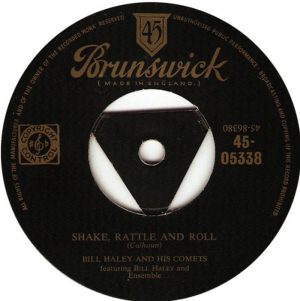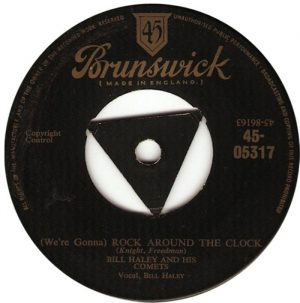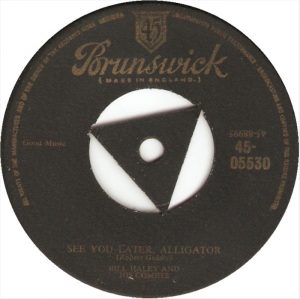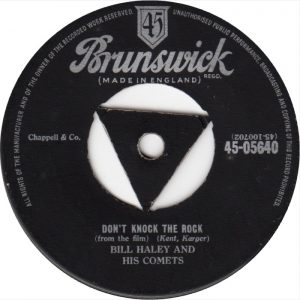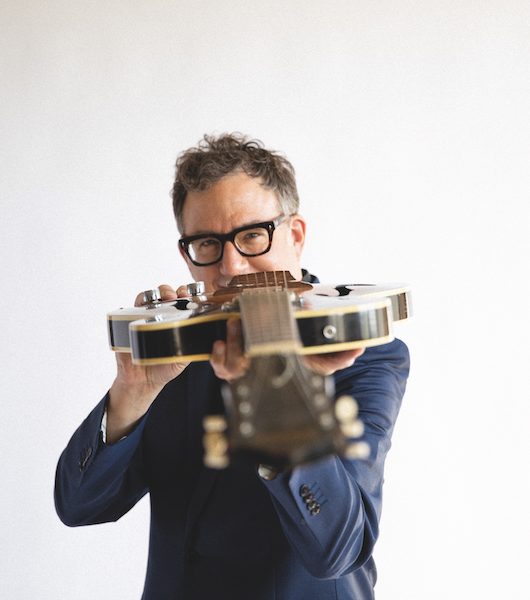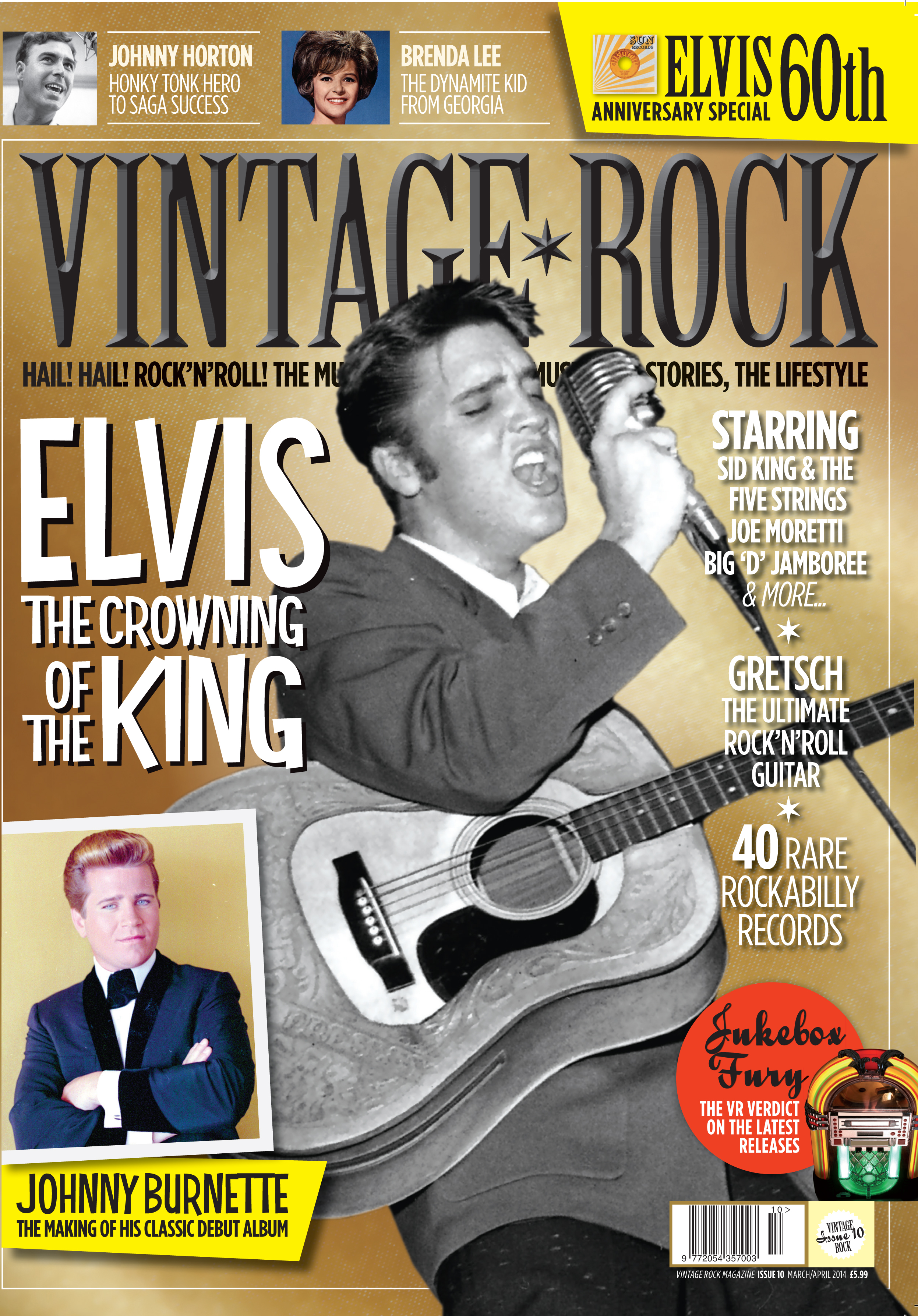Put your glad rags on and join Vintage Rock as we revisit Bill Haley & His Comets’ finest moments with help from Bill Haley Jr who keeps his father’s musical legacy alive today…
Words by Douglas McPherson
According to the Johnny Cash song, life ain’t easy for a boy named Sue… But spare a thought for the early life of a kid called Bill Haley Jr. “Growing up with my father’s name, I was constantly asked about him,” says the son of rock’n’roll’s founding father. “I was acutely aware that my father was famous, but he was out of my life – I had no contact with him. It was hard to explain to people why he had abandoned me.”
In the song A Boy Named Sue, the protagonist’s father deserts him at the age of three, leaving behind an old guitar and an empty bottle of booze. Bill Jr, by contrast, was seven when his dad walked out of his plush home, Melody Manor in Boothwyn, near Philadelphia, to start a new life with a new family in Mexico. He left behind the guitar that his son would eventually learn to play, quite a few empty bottles of booze, and a stack of gold records including one for arguably the most important single in the history of rock’n’roll, Rock Around The Clock.
Haley’s Comet
Junior was born to Haley’s second wife on 28 July 1955, right in the middle of Rock Around The Clock’s eight-week stay at the top of the US hit parade. It was the first rock’n’roll song to reach pole position, a feat it would repeat in the UK and Australia, and for the world at large it was the record that kickstarted the rock’n’roll era. Haley was in demand and his son’s memories of him are sparse.
“He was on the road a lot, so it wasn’t like I’d see him every day after work. My memories are mostly of summer holidays when he would have a month’s residency on the Jersey Shore and we’d join him in a rented house there. I remember some happy times, riding on his shoulders, walking down the boardwalk. I also remember him getting out his guitar and singing to us children at Christmas.”
His strongest recollection is of his father’s band rehearsing in the three-car garage at Melody Manor. “On several occasions I wandered into the garage and my father would give me a couple of drumsticks and a cardboard box and say play along with the band. I thought I was a Comet. It was awesome.”
Little did he know that his dad was about to fly away and, like a comet, not come back into his life for another 17 years.
Father Of Rock’n’Roll
William John Clifton (Bill) Haley was born to musical parents in Highland Park, Michigan, on 6 July 1925. Left blind in one eye by an operation when he was just four, he embarked on a career as a singing cowboy and formed his first band, the Texas Range Riders, when he was 18. Self-conscious about the way that his blind eye moved differently from his good one, he drew attention away from it by cultivating a kiss curl that became his trademark.
He also worked as a disc jockey and, unusually for a white presenter in the late 1940s, often played R&B songs, known then as ‘race records’. He began singing tracks such as Rock The Joint with his western swing band the Saddlemen and noticed that they went down a storm with younger dancers. Starting to play high school dances, he created a sound that mixed together western swing with R&B and big band jazz, while developing a wild stage show, with the bass player standing on his instrument.
Haley wasn’t the sole inventor of rock’n’roll. Many artists were independently blending styles and edging towards that sound. Haley, however, produced the genre’s first hit when he changed his band’s name to Bill Haley And His Comets and penned Crazy Man, Crazy, the first rock’n’roll record to appear on a national pop chart, making No.12 on Billboard’s Juke Box listing and No.11 on the Cash Box chart in 1953.
Clocking In
Haley was subsequently offered (We’re Gonna) Rock Around The Clock by James E. Myers who wrote it (under the pen name Jimmy De Knight) with Max C. Freedman. Haley might have recorded it earlier but for a feud between Myers and Haley’s producer Dave Miller, boss of the Essex label, who refused to touch anything Myers had a hand in.
When Haley’s deal with Essex ended in 1954, Myers arranged for him to record with Decca, beginning the period of his greatest success.
“What people don’t realise,” says Bill Jr, “is that it was a one-record deal – if it did well they’d record more, but that wasn’t guaranteed. The deal was that the producer Milt Gabler chose the A-side, Thirteen Women (And Only One Man In Town), which was written by Dickie Thompson and which Gabler owned a piece of, and Myers picked the B-side, Rock Around The Clock.”
The platter charted for a week at No.23, high enough to warrant a follow-up and Haley covered Big Joe Turner’s recent R&B hit Shake, Rattle And Roll. It was his first smash hit, making No.7 in the US and UK No.4.
At that point, Rock Around The Clock might have been forgotten had it not been the favourite spin of a teenager called Peter Ford. His dad, Glenn Ford, was the star of a forthcoming movie about teenage delinquency, Blackboard Jungle. The producers were looking for a song to sum up the mood and Ford suggested the one that his son was playing to death.
Teen Spirit
Exposure in the film turned Rock Around The Clock into a sensation, with teenagers famously causing riots in cinemas when they stood up to dance to it. “It was the right place, the right time and the right context,” explains Bill Jr. “Shake, Rattle And Roll was already a hit so when the teenagers saw that movie they knew who Bill Haley was. It was the perfect moment to strike a chord.”
Reissued as an A-side, Rock Around The Clock shot to the top of the charts. The hits continued with Dim, Dim The Lights (I Want Some Atmosphere) (US No.11), Burn That Candle (US No.9), its flipside, Rock-A-Beatin’ Boogie (UK No.4) and See You Later, Alligator (US No.6, UK No.7).
In 1956, Haley released the album Rock’n’Roll Stage Show which, despite its title and cover picture, was a studio album not a live recording. It included such classics as Rockin’ Through The Rye (UK No.3) and Hot Dog Buddy Buddy, which Haley performed in the film Don’t Knock The Rock. The disc topped the UK official Record Retailers chart.
In February 1957, Haley embarked on a triumphant and historically important tour of the UK. He was the first rock’n’roll star to cross the Atlantic and was greeted on arrival by a mob of up to 5,000 fans in a scene similar to the one that later greeted The Beatles on their first visit to the United States.
For Haley, however, the tour was the beginning of the end.
Turning Point
He returned to the States to find himself dethroned as the King Of Rock’n’Roll by a generation of younger, hipper stars that included Elvis Presley, Jerry Lee Lewis, Eddie Cochran and Gene Vincent – all of whom had more teen appeal than a moon-faced 32-year-old bandleader with a kiss curl. He was also in financial trouble, thanks to a series of business investments that all went sour. Worse still, he had acquired a habit in which to drown his sorrows.
“I wouldn’t say my father’s alcoholism was a reaction to fame,” says Bill Jr. “I think it was a reaction to losing fame, and losing his business empire. My father wasn’t a big drinker, growing up. Even playing in nightclubs six nights a week until two in the morning, he would drink coffee. “That continued through the glory years of 1954-56. In England he became exposed to Johnnie Walker scotch, and liked it. When he came back, he started drinking more and it reached a point of no return. By the time he fled to Mexico in 1962, alcoholism had taken over his life.”
Although the US hits dried up after the instrumental Rudy’s Rock (No.34 in 1956), Haley went on to score in the UK with The Saints Rock’N’Roll (No.5) and a cover of Little Richard’s Rip it Up (No.4).
Vive Le Rock And Roll
He continued to make stirring sounds including the fiercely energetic Rock The Joint and the tough and bluesy Skinny Minnie, the latter earning him a brief US chart comeback at No.22 in 1958. But he also made some poor choices, including an LP of rocked-up old chestnuts (Rockin’ The Oldies) and a set of novelty songs based on children’s folk tunes from various countries, with Frère Jacques becoming Vive Le Rock And Roll and Waltzing Matilda morphing into Rockin’ Matilda.
“Decca was desperately searching for a new formula that would sell,” says Bill Jr. “By 1958, my father’s records weren’t selling at all. Musical tastes had changed. “The combo sound was out.
“There was a backlash against rock’n’roll. But the band was still relatively popular around the globe so that was the genesis of Rockin’ Around The World. They chose folk songs probably because they were in the public domain and they didn’t have to share the royalties. It was Decca’s last gasp to find something that would sell.”
In 1959, Haley forsook rock’n’roll – and singing – for jazz instrumentals on Strictly Instrumental. The gamble worked, giving Haley and His Comets a No.1 in Australia with Joey’s Song and a minor US chart entry with Skokiaan (South African Song). The upward blip paved the way for a deal with Warner Brothers, but further hits weren’t forthcoming, and Haley found himself on a succession of smaller labels for the rest of the 60s.
A Rock’n’Roll Revival
He toured incessantly, working 40 or 50 weeks of the year and by the end of the decade was headlining Richard Nader’s highly successful oldies package shows at Madison Square Garden, alongside other 50s artists including Chuck Berry and The Coasters.
In 1972, Nader’s revival tour hit Philadelphia. Bill Jr went in hope of seeing his father, but Haley Sr didn’t show. The official excuse was illness but Junior believes his dad simply couldn’t face a hometown crowd that knew he had abandoned his family.
The 1970s saw a revival of interest in Haley, thanks to the inclusion of Rock Around The Clock in the movie American Graffiti, and as the theme song to Happy Days for the first two seasons of the 1950s-set sitcom. The song returned to the UK chart in 1974, reaching No.12, and made No.39 in the US.
Haley officially retired in 1977, following the death of his close friend and Comets saxophonist Rudy Pompilli the previous year. However, he returned to perform Rock Around The Clock for the Queen as part of the televised Royal Variety Performance in 1979. He also wowed an adoring sea of shoulder-to-shoulder teenage Teddy Boys and Girls at London’s premier rock’n’roll revival dance hall, the Royalty in Southgate.
On both occasions, he looked in pink-cheeked good health and sounded as slick as he had on his records of 25 years earlier. But those triumphant appearances only masked the fact that his mental and physical health was unravelling behind the scenes.
Burn That Candle
Banned by his third wife from living in his own house in Harlingen, Texas, because of his drunken and erratic behaviour, Haley moved into the pool house in his backyard.
Having not heard from his father since 1962, Bill Jr began receiving late night phone calls in 1979, sometimes four times a week. “By that point he was a hopeless alcoholic, rambling incoherently,” says the son. “But I was desperate for a relationship with my father so I would hang on the phone and try to engage with him. He talked about me going down to visit him, but because of his state of mind I was reluctant. Of course I did not expect him to die on 9 February 1981.”
The fallen King Of Rock was just 55 years old. The tragedy inspired Bill Jr to begin the lifelong project of writing his 2019 biography, Crazy Man Crazy: The Bill Haley Story, tracking down and interviewing every associate of his father’s that he could find in an effort to understand the man he’d barely known.
For the past 15 years, he has also led a tribute band, Bill Haley Jr And The Comets, keeping alive songs such as Shake, Rattle And Roll, See You Later Alligator, Don’t Knock The Rock and, of course, the one that sparked the rock’n’roll revolution, Rock Around The Clock.
“I want to emphasise that I hold no animosity towards my father for his alcoholism which I view as a disease that he fell victim to,” Bill concludes. “I have tremendous respect for him and remain a devoted fan of his contributions as a rock’n’roll pioneer.”
For more on Bill Haley Jr. And The Comets click here
Read More: Classic Album – Bill Haley & His Comets’ Rock Around The Clock


